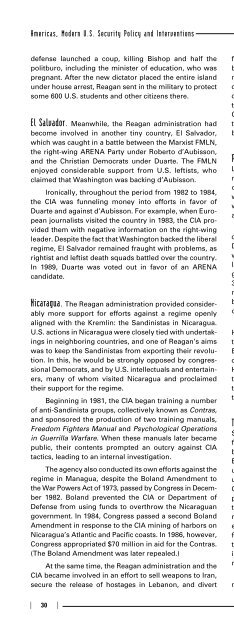ENCYCLOPEDIA OF Espionage, Intelligence, and Security Volume ...
ENCYCLOPEDIA OF Espionage, Intelligence, and Security Volume ...
ENCYCLOPEDIA OF Espionage, Intelligence, and Security Volume ...
You also want an ePaper? Increase the reach of your titles
YUMPU automatically turns print PDFs into web optimized ePapers that Google loves.
Americas, Modern U.S. <strong>Security</strong> Policy <strong>and</strong> Interventionsdefense launched a coup, killing Bishop <strong>and</strong> half thepolitburo, including the minister of education, who waspregnant. After the new dictator placed the entire isl<strong>and</strong>under house arrest, Reagan sent in the military to protectsome 600 U.S. students <strong>and</strong> other citizens there.El Salvador. Meanwhile, the Reagan administration hadbecome involved in another tiny country, El Salvador,which was caught in a battle between the Marxist FMLN,the right-wing ARENA Party under Roberto d’Aubisson,<strong>and</strong> the Christian Democrats under Duarte. The FMLNenjoyed considerable support from U.S. leftists, whoclaimed that Washington was backing d’Aubisson.Ironically, throughout the period from 1982 to 1984,the CIA was funneling money into efforts in favor ofDuarte <strong>and</strong> against d’Aubisson. For example, when Europeanjournalists visited the country in 1983, the CIA providedthem with negative information on the right-wingleader. Despite the fact that Washington backed the liberalregime, El Salvador remained fraught with problems, asrightist <strong>and</strong> leftist death squads battled over the country.In 1989, Duarte was voted out in favor of an ARENAc<strong>and</strong>idate.Nicaragua. The Reagan administration provided considerablymore support for efforts against a regime openlyaligned with the Kremlin: the S<strong>and</strong>inistas in Nicaragua.U.S. actions in Nicaragua were closely tied with undertakingsin neighboring countries, <strong>and</strong> one of Reagan’s aimswas to keep the S<strong>and</strong>inistas from exporting their revolution.In this, he would be strongly opposed by congressionalDemocrats, <strong>and</strong> by U.S. intellectuals <strong>and</strong> entertainers,many of whom visited Nicaragua <strong>and</strong> proclaimedtheir support for the regime.Beginning in 1981, the CIA began training a numberof anti-S<strong>and</strong>inista groups, collectively known as Contras,<strong>and</strong> sponsored the production of two training manuals,Freedom Fighters Manual <strong>and</strong> Psychological Operationsin Guerrilla Warfare. When these manuals later becamepublic, their contents prompted an outcry against CIAtactics, leading to an internal investigation.The agency also conducted its own efforts against theregime in Managua, despite the Bol<strong>and</strong> Amendment tothe War Powers Act of 1973, passed by Congress in December1982. Bol<strong>and</strong> prevented the CIA or Department ofDefense from using funds to overthrow the Nicaraguangovernment. In 1984, Congress passed a second Bol<strong>and</strong>Amendment in response to the CIA mining of harbors onNicaragua’s Atlantic <strong>and</strong> Pacific coasts. In 1986, however,Congress appropriated $70 million in aid for the Contras.(The Bol<strong>and</strong> Amendment was later repealed.)At the same time, the Reagan administration <strong>and</strong> theCIA became involved in an effort to sell weapons to Iran,secure the release of hostages in Lebanon, <strong>and</strong> divertfunds to the Contras. A pro-Syrian newspaper in Lebanonbroke the story of Iran-Contra in November 1986, <strong>and</strong> formany months thereafter, the administration would becaught up in the sc<strong>and</strong>al. Thanks to support for the Contras,combined with reductions in Soviet aid to the S<strong>and</strong>inistas,the two sides signed a ceasefire agreement in 1987. TheContras agreed to free elections in February 1990, <strong>and</strong>these resulted in the election of Violeta Chamorro, a memberof the liberal democratic opposition.Panama <strong>and</strong> Haiti. Although opponents of U.S. policy inLatin America cite early CIA alliances with Noriega, formost of his career as Panamanian dictator, Noriega wasopenly opposed to the United States <strong>and</strong> closely alignedwith Castro. He was also involved in drug trafficking, forwhich he was indicted by a Florida gr<strong>and</strong> jury in February,1988.In 1989, President H. W. Bush invested $10 million incl<strong>and</strong>estine radio broadcasts against Noriega, <strong>and</strong> inDecember launched Operation Just Cause. The operation,which involved 27,000 U.S. troops, was at the time thelargest U.S. military undertaking since Vietnam. Its statedgoals were the protection of the Panama Canal <strong>and</strong> the35,000 U.S. citizens living in Panama, as well as the removalof Noriega himself, promoting democracy, <strong>and</strong>bringing an end to drug activities in the country. Theoperation resulted in Noriega’s capture <strong>and</strong> trial.Less clear were the results of a military operation inHaiti, undertaken by the administration of William J. Clintonin 1994. The purpose was to restore President Jean-Bertr<strong>and</strong> Aristide, who had been deposed by a militarycoup, <strong>and</strong> in that regard, the operation was successful.However, political, economic, <strong>and</strong> social conditions on thetroubled isl<strong>and</strong> continued to erode, <strong>and</strong> in March, 1999,the remaining U.S. forces departed the isl<strong>and</strong> amid continuinginstability.The war on drugs. From Reagan’s time onward, the UnitedStates has been involved in the war on drugs to stop theflow of cocaine, marijuana, <strong>and</strong> other narcotics from Colombia,Peru, Bolivia, <strong>and</strong> other countries. The U.S. DrugEnforcement Administration (DEA) has been, <strong>and</strong> continuesto be, involved in this war, as is the CIA. The CIA hasundertaken cooperative efforts with the governments ofColombia <strong>and</strong> Peru to interdict drug traffickers. Part of thisprogram is an airborne initiative whereby CIA <strong>and</strong> nationalair force personnel shoot down aircraft whose pilotsrefuse to identify themselves. In many regards, theseefforts have been successful, <strong>and</strong> helped to reduce theflow of drugs; however, in April 2001, miscommunicationsresulted in the Peruvian shootdown of a plane carryinga U.S. missionary family. The mother <strong>and</strong> her sevenmonth-olddaughter were killed.In the post-Cold War environment, drug gangs are amuch greater threat to stability in Latin America than are30 Encyclopedia of <strong>Espionage</strong>, <strong>Intelligence</strong>, <strong>and</strong> <strong>Security</strong>







![The Big Lie 9-11 and Government Complicity in Mass Murder [PDF]](https://img.yumpu.com/50957077/1/190x245/the-big-lie-9-11-and-government-complicity-in-mass-murder-pdf.jpg?quality=85)








